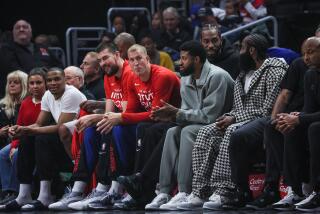Rodman Might Not Play Today : NBA finals: His bad ankle gets worse. Pistons try to end 20-game losing streak in Portland.
- Share via
PORTLAND, Ore. — The bench, long a Detroit Piston luxury, today becomes a necessity for Game 3 of the NBA finals, just in time to add to the problems heading into Portland Memorial Coliseum, the site of a 16-year losing streak.
Coach Chuck Daly had all but decided Friday that Dennis Rodman would give way to Mark Aguirre in the starting lineup, Rodman’s left ankle having worsened again. But Saturday, Daly indicated there was a good chance that Rodman, the NBA defensive player of the year and irreplaceable on the offensive boards, would not play at all today.
No one is sure about future games, either. Rodman has spent the past couple of days, since the Trail Blazers’ Game 2 overtime victory evened the series, on a schedule of ice massages, ultra-sound treatments and anti-inflammation medication, but the condition remains so bad that team physician Dr. Benjamin Paolucci gave a conditional approval to playing.
“If it was not such an important game, he probably would not play,” Paolucci said. “That doesn’t mean he shouldn’t play.
“The injury had improved. He got away all of Game 1 without having to use the trampoline to keep the ankle loose. But right now, he’s probably back to where he was when he first hurt it.”
That would have been Game 4 of the Eastern Conference finals against Chicago. Part of Rodman’s treatment then was for all to see--bouncing lightly on a small trampoline during games at the end of the Piston bench. When he jammed the ankle again while going for a rebound of his own missed free throw in the first quarter Thursday at Auburn Hills, Mich., it was back to the trampoline, though sitting on a chair with the left leg bouncing solo.
The impact of the injury was immediate and costly. On Portland’s final possession of overtime, as Clyde Drexler drove toward the right side of the lane, the only defense Rodman had was a hand check on the hip that sent Drexler to the free throw line for the two winning shots with 2.1 seconds left.
“I saw him limp off after that,” Trail Blazer Coach Rick Adelman said. “But I looked at the tape later, and it was the very first step (by Drexler) that beat him. That’s why he had to put the hand check on, because he wouldn’t have caught him otherwise. Dennis Rodman normally gets there and gets position. He moves his feet so well, but he didn’t on that play.”
To which Rodman replied: “I think with a healthy Dennis Rodman, we wouldn’t have been in that position.”
In other words, in overtime and in position to lose the game. He finished with one point and eight rebounds in 25 minutes, this after playing only 23 minutes before fouling out in Game 1.
The injury strikes at the heart of Rodman’s game, his leaping ability. If there is any positive, he should be OK on defense going from side to side and backward, Paolucci said.
“It’s very difficult to see the ball coming off the rim and not be able to jump for it the way I like,” said Rodman, who Saturday estimated his strength at 75%.
So left to Rodman, how much could he contribute today?
“I will tell you about 30 minutes, but I can’t do that. I’m not effective at all on the offensive boards.”
Aguirre back in the starting lineup would not be such a shock to the Piston system if it came at any other time than the day before a big-game situation. He started 39 times, after all.
“The adjustment was for me to go to the bench,” Aguirre said. “This is not an adjustment. This is what I’m used to.”
But to have this happen with Rodman limping and Joe Dumars apparently still bothered by a groin injury, and concerns escalate. The Pistons base almost all their success on team defense, of knowing where the help is around them, so a sense of cohesiveness is all important.
Dumars played 41 minutes in Game 2, and Paolucci and trainer Mike Abdenour both pronounced him fit Saturday. But the team’s second-leading scorer in the playoffs wasn’t sounding nearly as convincing.
“I don’t want to use it as a crutch,” said Dumars, whose 17.5 points-per-game average trails only the 19.2 by backcourt partner Isiah Thomas. “That’s why I don’t want to talk about it a lot. It hurts, but it’s part of sports. You’ve got to play in pain.”
The Pistons have been hurting here since Oct. 19, 1974, a 122-99 victory followed by 20 consecutive defeats. The most recent was a 20-point pasting Nov. 26, when they were held to 30 points in the first half.
“I think it is a big deal if you can’t win in another building,” Daly said. “But we’ve faced that over the years with Boston and L.A. and other teams. That’s all part of it.”
Except that if the Pistons continue to get shut out and lose the next three here, the series is over.
“We’ve got to get it back to our building somehow,” Daly said. “It might be a little difficult though.”
Adelman was a bit more direct: “We expect their best shot. If they’re not ready to play, they could be in trouble.”
More to Read
Go beyond the scoreboard
Get the latest on L.A.'s teams in the daily Sports Report newsletter.
You may occasionally receive promotional content from the Los Angeles Times.










